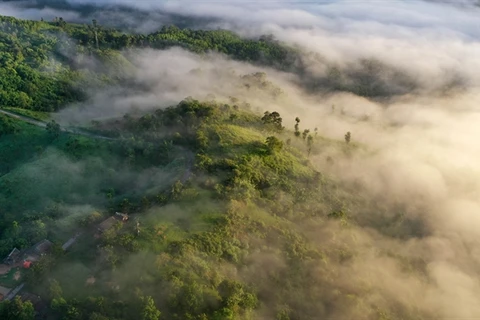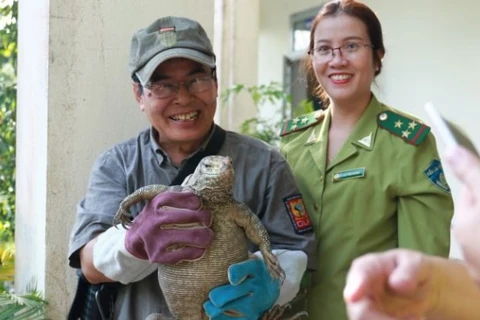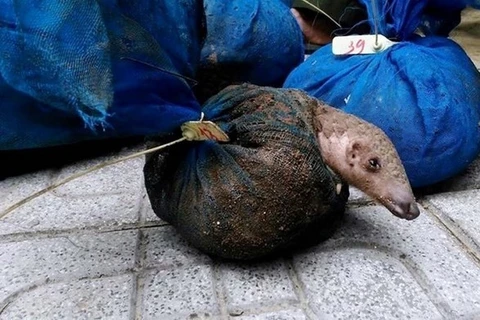Hanoi (VNA) – More than a year after the COVID-19 outbreak, a new report by the World Wide Fund for Nature (WWF) and GlobeScan shows that there is a strong understanding that risky human-animal interaction, often connected to deforestation and high-risk wildlife trade, can lead to serious disease outbreaks.
The report entitled “COVID-19 One Year Later: Public Perceptions about Pandemics and their Links to Nature” builds on the study “Opinion Survey on COVID-19 and Wildlife Trade in 5 Asian Markets” conducted by WWF and GlobeScan in 2020 to understand public attitudes and behaviours regarding COVID-19 and future pandemics.
It said 46 percent of all surveyed participants listed disease transmission from animals to humans as the root cause most likely to trigger future pandemics.
In addition, the majority of those surveyed believe that preventing future pandemics begins with addressing root causes, including high-risk wildlife trade and deforestation.
People from all five surveyed countries, including Vietnam, China, Myanmar, Thailand and the US, strongly support government efforts to close high-risk markets selling animals from the wild (85 percent) and stop deforestation (88 percent). In Vietnam, the agreement rates to these matters are 94 percent and 95 percent, respectively.
Marco Lambertini, WWF International Director General, said that the prevention of pandemics is estimated to cost 100 times less than responding to them. The pandemic has made it blatantly clear that investing in planetary health and nature is the only way to avoid paying such a terrible social and economic price again in the future.
The report results serve as an important foundation for Vietnam and other countries in the region to consider decisions on closing wildlife markets and closing forests to proactively prevent the pandemic.
WWF is calling on decision makers to include interventions needed to address key drivers of zoonotic disease outbreaks in their pandemic prevention plans. Closing forests and high-risk wildlife markets, for example, will help recover wildlife populations and maintain local and global biodiversity that naturally help regulate disease, as well as help ensure the sustainable use of natural resources.
To support the fight against COVID-19, citizens are highly recommended not to buy, sell or consume wildlife products to prevent pandemics and ensure the safety of themselves and the community./.
The report entitled “COVID-19 One Year Later: Public Perceptions about Pandemics and their Links to Nature” builds on the study “Opinion Survey on COVID-19 and Wildlife Trade in 5 Asian Markets” conducted by WWF and GlobeScan in 2020 to understand public attitudes and behaviours regarding COVID-19 and future pandemics.
It said 46 percent of all surveyed participants listed disease transmission from animals to humans as the root cause most likely to trigger future pandemics.
In addition, the majority of those surveyed believe that preventing future pandemics begins with addressing root causes, including high-risk wildlife trade and deforestation.
People from all five surveyed countries, including Vietnam, China, Myanmar, Thailand and the US, strongly support government efforts to close high-risk markets selling animals from the wild (85 percent) and stop deforestation (88 percent). In Vietnam, the agreement rates to these matters are 94 percent and 95 percent, respectively.
Marco Lambertini, WWF International Director General, said that the prevention of pandemics is estimated to cost 100 times less than responding to them. The pandemic has made it blatantly clear that investing in planetary health and nature is the only way to avoid paying such a terrible social and economic price again in the future.
The report results serve as an important foundation for Vietnam and other countries in the region to consider decisions on closing wildlife markets and closing forests to proactively prevent the pandemic.
WWF is calling on decision makers to include interventions needed to address key drivers of zoonotic disease outbreaks in their pandemic prevention plans. Closing forests and high-risk wildlife markets, for example, will help recover wildlife populations and maintain local and global biodiversity that naturally help regulate disease, as well as help ensure the sustainable use of natural resources.
To support the fight against COVID-19, citizens are highly recommended not to buy, sell or consume wildlife products to prevent pandemics and ensure the safety of themselves and the community./.
VNA
























